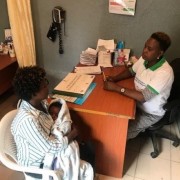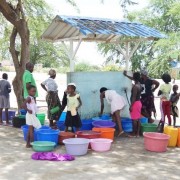Speeches Shim

The USAID Health for All project supports the Ministry of Health through its National Directorate of Public Health, National Malaria Control Program, and the Reproductive Health Department to increase the effectiveness of Government of the Republic of Angola’s resources in satisfying the health needs of its population.

Water is one of the most important resources in our planet, people, animals and plants, all need water for survival. For 47% of the population in Angola, clean drinking water is more valuable than the real black gold in the second largest oil producer in Africa. Angola has one of the world’s highest child mortality rates, with 72 deaths in 1000 children before they complete the age of 5. According to UNICEF’s Promise Renewed 2015 Annual Report, 14 % of the child deaths in Angola are caused by unsafe water sources or waterborne diseases or worsening the prevalence of malnutrition. In 2017 the first Demographic Health Survey in country reported that just over half of households, 53% have access to appropriate drinking water sources, 67% of which in urban areas 32% in rural areas.
The U. S. Agency for International Development (USAID) funded Health for All Project, in collaboration with the National Malaria Control Program (NMCP) and the U.S. Government’s President's Malaria Initiative (PMI), presented final results of the Quantitative and Qualitative Long Lasting Insecticide Treated Nets (LLINs) Care and Use Study. The event was held in Luanda on October 21.
The second Demographic Health Survey 2020 (DHS 2020) was officially launched in Luanda by the Angola National Statistics Institute (INE), in collaboration with the Ministry of Health. The survey, which will publish the results by the end of 2020, aims to update demographic health indicators such as fertility rate, maternal and child mortality, prevalence of HIV/AIDS, and anemia and nutrition levels in children. DHS 2020 will also update current life expectancy and other demographic and social information. The implementation of the survey will be funded through the World Bank’s Strengthen Health Systems project which is contributing 4.9 million US Dollars (USD), USAID is contributing 1.6 million USD, and UNICEF and UNFPA 400,000 USD.
During the week of September 30 – October 3, 2019, Financial Services Volunteer Corps (FSVC) conducted a successful workshop in Luanda, Angola, with 32 representatives from the Angolan Parliament, the National Court of Accounts, the Ministry of Finance and the Civil Society Organization (CSO) Group for Budget Participation. The activity is part of USAID/Southern Africa’s Strengthening Anti-Corruption Efforts Project in Angola with the objective of supporting public financial management and fiscal transparency. The workshop was organized to improve the coordination and oversight techniques among the four institutions responsible for matters related to budget management. To ensure the effective management of public resources, branches of government and public oversight institutions must work together to ensure that expenditure practices are in agreement with budgeted targets and objectives. Without this collaboration and oversight, the public is unable to hold government institutions accountable for revenues and expenditures, creating the potential for financial mismanagement and corruption. FSVC organized this workshop to improve the coordination between government oversight institutions and CSOs.


Comment
Make a general inquiry or suggest an improvement.